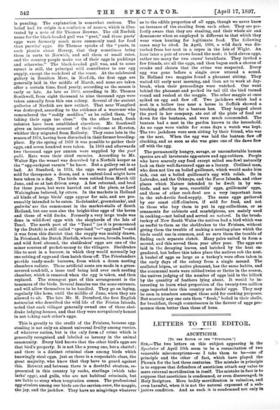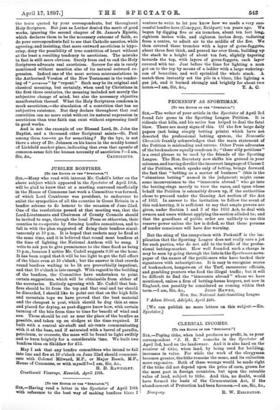LETTERS TO THE EDITOR.
ASCETICISM.
[To THY EDITOR 07 THE " PPECTATOR."] SIR,—The two letters on this subject appearing in the Spectator of April 10th seem to be a resuscitation of two venerable misconceptions—so I take them to be—one of principle and the other of fact, which have played the Phoenix for the last three centuries. The mistake in principle is to suppose that defenders of asceticism attach any value to mere external mortification in itself. The mistake infect is to suppose that asceticism is condemned, or even discouraged, in Holy Scripture. Mere bodily mortification is valueless, and even harmful, when it is not the natural exponent of a sub- jective condition. And as such it is condemned not only in the texts quoted by your correspondents, but throughout Holy Scripture. But just as Lather denied the merit of good works, ignoring the second chapter of St. James's Epistle, which declares them to be the necessary outcome of faith, so do your correspondents fail to see that Catholic ascetics, while agreeing, and insisting, that mere outward asceticism is hypo- crisy, deny the possibility of true contrition of heart without at the least a resulting tendency to asceticism. The mistake in fact is still more obvious. Surely from end to end the Holy Scriptures advocate real asceticism. Sorrow for sin is rarely mentioned without mention also of its natural outward ex- pression. Indeed one of the most serious mistranslations in the Authorised Version of the New Testament is the render- ing of " FETZYOEC4" by "repent." Snch may be its original and classical meaning, but certainly, when used by Christians in the first three centuries, the meaning included not merely the subjective change of mind, but also the necessary objective manifestation thereof. What the Holy Scriptures condemn is mock asceticism,—the simulation of a contrition that has no subjective existence. But they declare throughout that real contrition can no more exist without its natural expression in asceticism than true faith can exist without expressing itself in good works.
And is not the example of our Blessed Lord, St. John the Baptist, and a thousand other Scriptural saints—St. Paul among them too—to go for something ? By the bye, is not there a story of Dr. Johnson on his knees in the muddy kennel of Lichfield market-place, indicating that even that apostle of common-sense felt the human necessity of asceticism P—I am,



































 Previous page
Previous page